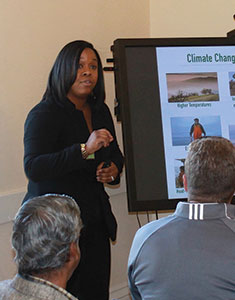Melanie D. Harrison-Okoro ’11, Ph.D. environmental science, was raised outside Tuskegee, Alabama, where her family taught her to catch bass and catfish on Lake Martin. “My twin sister and I were out on the lake all the time with my great-grandmother,” she says. “She was the person who taught us about conservation and preservation. It just stuck.”
Twenty-five years later, Harrison-Okoro is responsible for the well-being of fish species across the Western United States. As an environmental scientist and water quality specialist for the National Oceanic and Atmospheric Administration (NOAA), Harrison- Okoro monitors the health of rivers in California, Idaho, Oregon, and Washington.
“On any given day,” she says, “I could be working on the Columbia River, the Klamath, the Feather – wherever folks need my expertise.”
Harrison-Okoro first came to Maryland for a summer internship in 2005, just after she graduated from Johnson C. Smith University, a historically black institution in North Carolina. She worked at the Baltimore outpost of the Cary Institute of Ecosystem Studies, a New York-based research center, spending long hours alongside streams and rivers in and around Baltimore, assessing the dynamics of nitrogen hot spots.
“I learned that summer about agricultural and urban nitrogen runoffs, and about algae blooms that can kill off everything in a stream,” she says.
Peter M. Groffman, a microbial ecologist at the Cary Institute and an adjunct professor at UMBC, was Harrison-Okoro’s mentor. “I could see right away that she had an aptitude for this,” Groffman says. “The trick in environmental science is to identify testable, significant questions in a complex setting with lots of uncontrolled variables, and Melanie is very good at that.”
In the spring of 2006, Harrison-Okoro was working in a lab in Winston-Salem, North Carolina. “We were studying the impact of cocaine on rhesus monkeys,” she says. “I hated it.” One evening, she got a call from Groffman. UMBC had just received a major grant from the National Science Foundation to launch an interdisciplinary doctoral program in urban ecology. Would she be interested in applying?
The decision to go to UMBC meant turning away from a long-held plan to pursue a medical degree. But Harrison-Okoro has never regretted the new path she chose. She especially appreciated the design of the degree program. “The idea was that we would have depth in a specific discipline, but also have breadth across a range of disciplines,” Harrison-Okoro says. “We studied economics, we studied ecology, we studied public policy. All of these things were interwoven.”
For her dissertation project, Harrison-Okoro continued to examine nitrification in the Baltimore region. Among other things, she found evidence that local urban wetlands absorb a significant amount of agricultural nitrate runoff, preventing it from polluting the Chesapeake. In a 2011 paper in the Journal of Environmental Quality, Harrison-Okoro and four co-authors argued that with proper management, urban wetlands might play that denitrification role even more effectively.
“At her dissertation defense, she just blew me out of the water,” says Claire Welty, a professor of chemical, biochemical, and environmental engineering, and the director of UMBC’s Center for Urban Environmental Research and Education. “She was in total command of her material.”
In 2009, Harrison-Okoro received a federal doctoral traineeship from NOAA that provided her with federal supported for her last two years of graduate school in exchange for a commitment to serve at NOAA after graduation.
The offer meant moving to northern California, far away from family and friends. It also meant turning somewhat away from a focus on the ecology of cities. “I was interested initially in urban streams and the built environment. But I’ve been able to translate the two things that I love to talk about – which are fish and water quality – into the work that I do here with NOAA, which is very, very cool.”
The bulk of Harrison-Okoro’s work today concerns preserving river populations of chinook salmon, delta smelt, and green sturgeon, all of which have come under pressure during the California drought.
Harrison-Okoro also spends a good deal of time encouraging African-American and Latino students to pursue graduate studies in science, engineering, and mathematics. “In the last year, I’ve spoken to community groups in San Francisco, in Contra Costa County, in Sacramento,” she says. “I can’t say no to these things. My passion is to see increased diversity not only in the field I work in, but all across the STEM fields. I appreciate that UMBC has that commitment, and I want to carry it forward.”
— David Glenn
Tags: Winter 2016



